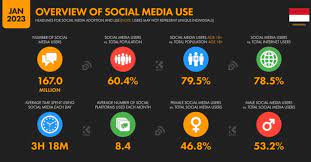The landscape of business has undergone a transformative indonesia media online evolution, driven by technological advancements, globalization, and shifting consumer behaviors. In the modern marketplace, businesses must navigate a complex web of challenges and opportunities to thrive. This article explores the key elements that define contemporary business practices, the impact of technology, the importance of sustainability, and strategies for success in an increasingly competitive environment.
The Technological Revolution
Digital Transformation
The digital revolution has fundamentally altered how businesses operate. From automation and artificial intelligence (AI) to big data and cloud computing, technology has enabled companies to streamline operations, enhance efficiency, and make data-driven decisions. Digital transformation is no longer optional but a necessity for survival in the modern marketplace.
- Automation and AI: Automation reduces manual tasks, improves accuracy, and frees up human resources for more strategic activities. AI, on the other hand, provides insights through predictive analytics, enhances customer service through chatbots, and personalizes marketing efforts.
- Big Data: Data is the new oil. Businesses harness vast amounts of data to understand consumer behavior, optimize supply chains, and improve product offerings. The ability to analyze and act on data is a critical competitive advantage.
- Cloud Computing: Cloud technology offers scalability, flexibility, and cost savings. It allows businesses to store and access data from anywhere, facilitating remote work and collaboration.
Globalization and Market Dynamics
Expanding Horizons
Globalization has opened new markets and increased competition. Businesses can reach customers worldwide, but they must also navigate diverse cultural, regulatory, and economic environments.
- Market Expansion: Companies can tap into emerging markets with growing consumer bases. However, understanding local preferences and adapting products and marketing strategies is crucial.
- Supply Chain Management: Global supply chains offer cost advantages but also pose risks. Businesses must manage complexities such as geopolitical tensions, trade policies, and logistics challenges.
- Cultural Sensitivity: Effective communication and cultural sensitivity are vital. Businesses must respect local customs, values, and norms to build trust and foster long-term relationships.
Sustainability and Corporate Responsibility
The Triple Bottom Line
Sustainability is no longer a buzzword but a business imperative. Companies are increasingly held accountable for their environmental and social impact, in addition to financial performance.
- Environmental Stewardship: Businesses must adopt sustainable practices, such as reducing carbon footprints, minimizing waste, and using renewable resources. Consumers prefer brands that demonstrate environmental responsibility.
- Social Responsibility: Companies are expected to contribute positively to society. This includes fair labor practices, community engagement, and supporting diversity and inclusion.
- Governance: Strong corporate governance ensures ethical behavior, transparency, and accountability. It builds trust with stakeholders and mitigates risks.
Strategies for Success
Innovation and Agility
Success in the modern business environment requires continuous innovation and agility. Companies must be proactive, adaptable, and customer-centric.
- Customer-Centric Approach: Understanding and anticipating customer needs is crucial. Personalized experiences and exceptional customer service differentiate successful businesses.
- Agile Methodologies: Agile practices enable companies to respond quickly to market changes. This involves iterative processes, cross-functional teams, and a focus on delivering value.
- Innovation Ecosystems: Collaboration with startups, research institutions, and other partners fosters innovation. Open innovation ecosystems accelerate the development and adoption of new technologies and solutions.
Conclusion
The modern business landscape is characterized by rapid change, technological advancements, and increased complexity. To thrive, businesses must embrace digital transformation, navigate global market dynamics, commit to sustainability, and adopt agile and innovative practices. By understanding and addressing these key elements, companies can position themselves for long-term success in an ever-evolving marketplace.
